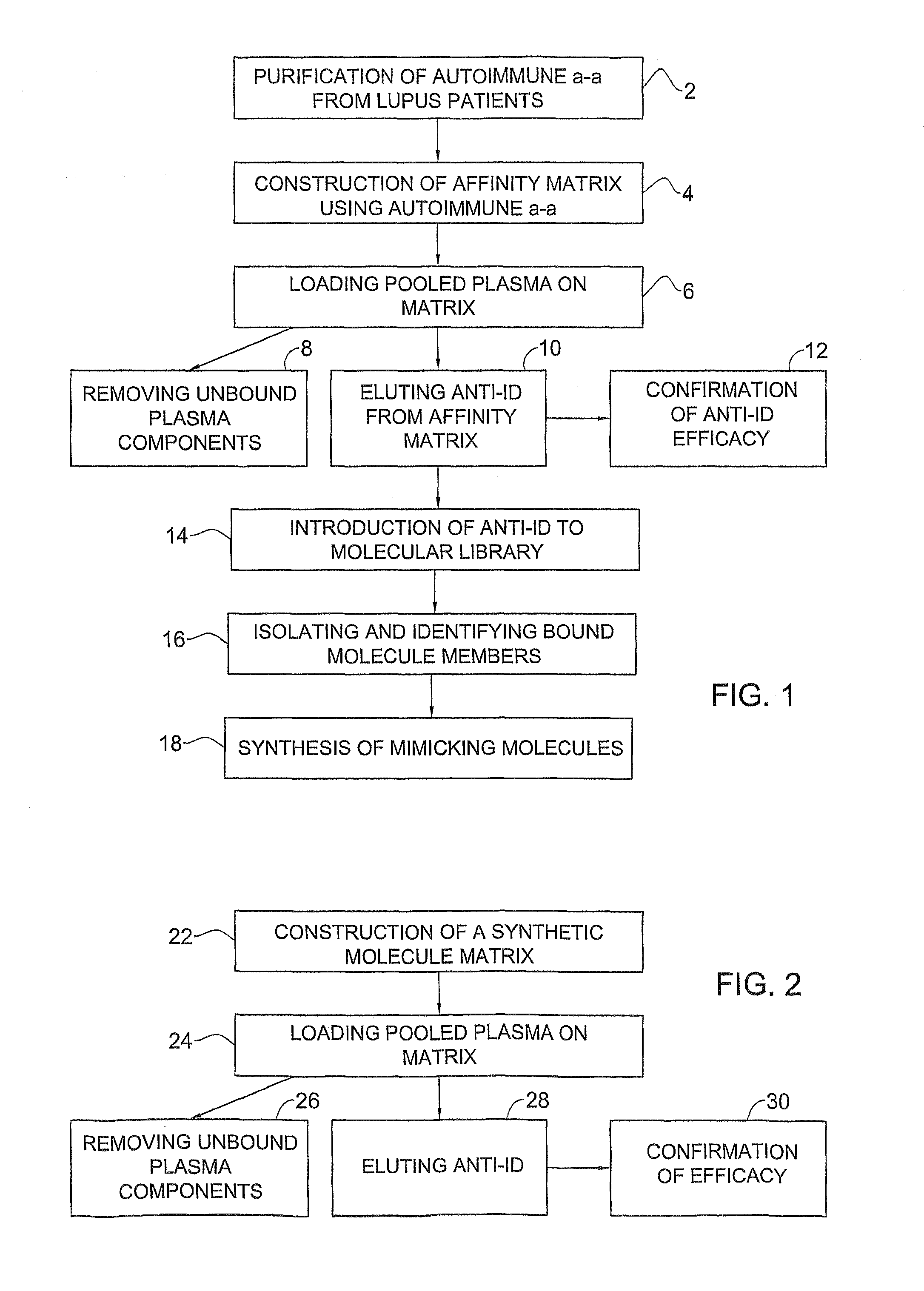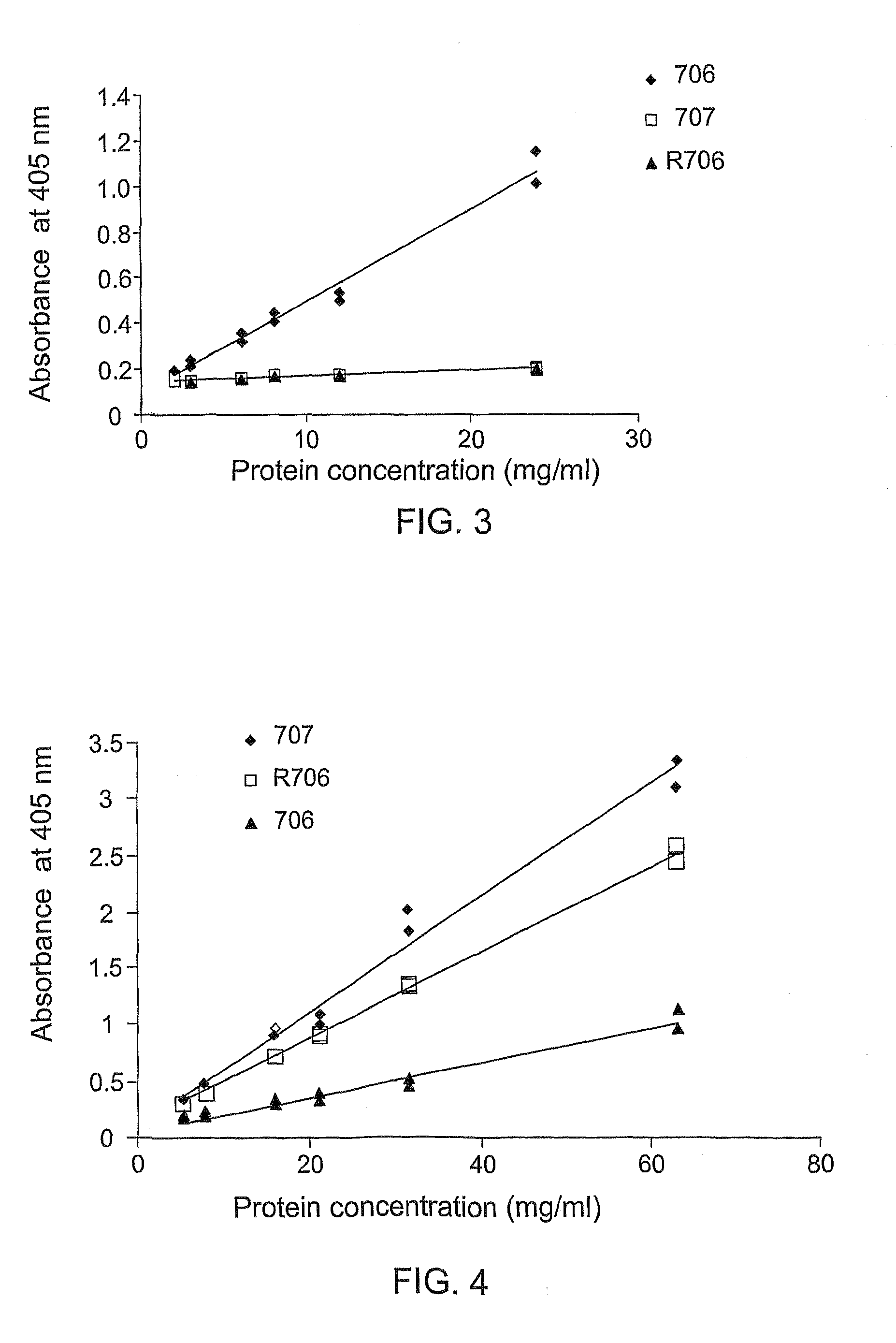Molecules mimicking an autoantibody idiotype and compositions containing same
a technology of autoantibody and composition, applied in the field of immunoglobulins, can solve the problems of high variability and unpredictable clinical course of sle, severe limitation of use, and limited cost of ivig in the treatment of sl
- Summary
- Abstract
- Description
- Claims
- Application Information
AI Technical Summary
Benefits of technology
Problems solved by technology
Method used
Image
Examples
example i
[0080]One embodiment of a method for identifying molecules which mimic idiotypes of an autoimmune-a-a is illustrated in FIG. 1.
[0081]The first step of the method, indicated in FIG. 1 by reference numeral 2, involves purifying autoantibodies from sera of one or more patients afflicted with the autoimmune disease. For example, anti-double-stranded DNA (anti-dsDNA) antibodies may be purified from several tens of patients suffering from SLE (lupus patients). In the next step 4, the autoantibodies are bound to a solid phase to form an affinity matrix. Following the above example, the anti-dsDNA antibodies are bound to a CNBr-activated Sepharose column.
[0082]The following step 6 comprises contacting pooled plasma comprising immunoglobulins with the affinity matrix followed by the step 8 of removal of unbound plasma components. In the example, IVIG is loaded on the affinity column which is subsequently washed to remove unbound immunoglobulins. Only the immunoglobulins which bind the anti-d...
example ii
[0085]One embodiment of a method for preparation of anti-Id to autoantibodies is illustrated in FIG. 2.
[0086]In the first step 22, an affinity matrix is prepared by binding the mimicking molecules obtained by the method illustrated in FIG. 1 to a solid phase to form a second affinity matrix. The mimicking molecules may be those isolated from the molecular library, or other molecules synthesized on the basis of the isolated molecules. Following the example given with respect to FIG. 1, these would be peptides which mimic idiotypes of the anti-dsDNA antibodies.
[0087]In the next step 24, pooled plasma comprising immunoglobulins is contacted with this second affinity matrix followed by removal 26 of unbound plasma components. In the example, IVIG is loaded on the column which is subsequently washed to remove unbound immunoglobulins. In the following step 28, the anti-Id is eluted from the affinity matrix. The efficacy of the anti-Id may be confirmed 30, for example by in vitro tests and...
example iii
Identification of Molecules, which Mimic Idiotypes of an Autoantibody
1. Materials and Methods
[0088]Anti-anti-dsDNA (anti-Id) isolated from IVIG as described above in Example I was employed to detect specific peptides presented by M13 phages. A commercial Ph.D.7™ phage display library (cat. number E8100S, New England Biolabs Inc) was used according to the manufacturer's procedure, slightly modified by the inventors, as follows:
[0089]Anti-Id in 50 mM NaHCO3 (Ph 8.5) was biotinylated by adding Sulfo-NHS-LC-Biotin (Pierce #21335), incubated 2 hrs on ice and dialyzed against 2% maltose. The efficacy of biotinylation was assayed by ELISA on neutravidine coated plates.
[0090]Biotinylated (1 μg) was introduced to the peptide phage display library (10 μg-2×1011 pfu) overnight at 4° C. The mixture was subjected to streptavidin coated petri-dish (3 cm, Nunc) blocked with 3% BSA. Following 20 minutes of incubation, the non-specific low affinity binding between streptavidin and the phages was pre...
PUM
 Login to View More
Login to View More Abstract
Description
Claims
Application Information
 Login to View More
Login to View More - R&D
- Intellectual Property
- Life Sciences
- Materials
- Tech Scout
- Unparalleled Data Quality
- Higher Quality Content
- 60% Fewer Hallucinations
Browse by: Latest US Patents, China's latest patents, Technical Efficacy Thesaurus, Application Domain, Technology Topic, Popular Technical Reports.
© 2025 PatSnap. All rights reserved.Legal|Privacy policy|Modern Slavery Act Transparency Statement|Sitemap|About US| Contact US: help@patsnap.com


